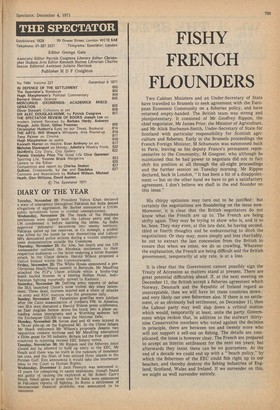FISHY FRENCH FLOUNDERS
Two Cabinet Ministers and an Under-Secretary of State have travelled to Brussels to seek agreement with the European Economic Community on a fisheries policy, and have returned empty-handed. The British team was strong and plenipotentiary. It consisted of Mr Geoffrey Rippon, the chief negotiator, Mr James Prior, the Minister of Agriculture, and Mr Alick Buchanan-Smith, Under-Secretary of State for Scotland with particular responsibility for Scottish agriculture and fisheries. Early in the Brussels proceedings the French Foreign Minister, M Schumann was summoned back to Paris, leaving as his deputy France's permanent representative to the Community, M Goegner, who although he maintained that he had power to negotiate did not in fact shift his position at all through the all-night proceedings and the further session on Tuesday morning. Mr Rippon declared, back in London, "It has been a bit of a disappointment — but on the other hand we have to get a satisfactory agreement. I don't believe we shall in the end flounder on this issue."
His chirpy optimism may turn out to be justified : but certainly the negotiations are floundering on the issue now. Moreover, it is clear that the British negotiators do not know what the French are up to. The French are being shifty again. They may be trying to show who is, and is to be, boss. They may even, at this late date, be having second, third or fourth thoughts and be endeavouring to ditch the negotiations. Or they may, more simply and less charitably, be out to extract the last concession from the British to ensure that when we enter, we do so crawling. Whatever the explanation, the French are being difficult and the British government, temporarily at any rate, is at a loss.
It is clear that the Government cannot possibly sign the Treaty of Accession as matters stand at present. There are great potential difficulties ahead. If, at the next meeting on December 11, the British accept a fisheries agreement which Norway, Denmark and the Republic of Ireland regard as unacceptable, then we will have let these countries down : and very likely our own fishermen also. If there is no settlement, or an obviously bad settlement, on December 11, then the Labour party may well slap down a critical motion which would, temporarily at least, unite the party. Government whips reckon that, in addition to the stalwart thirtynine Conservative members who voted against the decision in principle, there are between ten and twenty more who will not support a sell-out on fishing. The details are complicated; the issue is however clear. The French are prepared to accept an interim settlement for the next ten years; but afterwards they insist there can be no guarantees. At the end of a decade we could end up with a "beach policy," by which the fishermen of the EEC could fish right up to our beaches, and thereby destroy the fishing industries of England, Scotland, Wales and Ireland. If we surrender on this, we might as well surrender entirely.










































 Previous page
Previous page